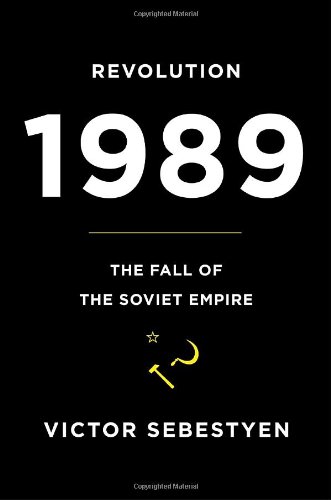Revolution 1989: The Fall of the Soviet Empire
Sebestyen, Victor
About the Book
Description:
SHIPS FROM USA. Used books have different signs of use and do not include supplemental materials such as CDs, Dvds, Access Codes, charts or any other extra material. All used books might have various degrees of writing, highliting and wear and tear and possibly be an ex-library with the usual stickers and stamps. Dust Jackets are not guaranteed and when still present, they will have various degrees of tear and damage. All images are Stock Photos, not of the actual item. Seller Inventory # 2-0375425322-G
About this title:
Synopsis: From the author of Twelve Days: The Story of the 1956 Hungarian Revolution comes a revealing new account of the collapse of the Soviet Union’s European empire during months of largely peaceful revolution that profoundly changed the world.
At the start of 1989, six European nations were Soviet vassal states. By year’s end, they had all declared national independence, embarking on the road to democracy. How did it happen so quickly? Why did the USSR capitulate so readily? Victor Sebestyen, who was on the scene reporting for the London Evening Standard at the time, draws on his firsthand knowledge of the events of 1989, on scores of interviews with other witnesses and participants, and on newly uncovered archival material to answer these questions in unprecedented depth.
Sebestyen tells the story through the eyes of ordinary men and women, some of whom found themselves almost miraculously transformed: the furnace stoker who became the Czech foreign minister; the Romanian poet who, just freed from jail, was made vice president of the newly liberated nation. He shows how power was wielded or ceded by Mikhail Gorbachev, George H. W. Bush, Lech Walesa, Václav Havel, and Margaret Thatcher, among others; how the KGB helped bring down former allied regimes; how the United States tried to slow the process; and why the collapse of the Iron Curtain was the catalyst for the fall of the entire Soviet empire.
Authoritative, riveting in both its broad political sweep and its abundance of personal detail, this is an essential addition to the annals of contemporary history.
Review:
Victor Sebestyen on Revolution 1989
- The principal reasons the Soviet empire fell was the USSR's disastrous decade-long war in Afghanistan, which is eerily reminiscent of the conflict the West is involved in now. Soviet generals of 20 or 25 years ago were saying almost identical things about their war against the Mujahideen (The Army of God) as NATO soldiers are saying now fighting the Taleban. Just substitute the names and it would be hard to spot the difference. Even more topically, many of the places where battles are being fought now are the same as then.
- Almost nobody predicted the sudden and speedy collapse of Communism--and its defeat was the last war that the West won. Almost nobody in politics, diplomacy, the military, the media or academia saw it coming. Least of all was it predicted by the intelligence agencies.
- Despite trillions of dollars and rubles spent on spying in forty years of Cold War--as well as a vast industry in espionage books and movies--the spooks in the East and West were hopelessly ill informed. The CIA consistently over-emphasized the strength of the Soviet bloc. Even in the Spring of 1989 the then Director of the CIA, Robert Gates, said the Soviets would use force to keep their hold on the East Europe states and, amongst other wrong calls, said the Kremlin would "never" let the Berlin Wall come down. Robert Gates is now US Secretary for Defense.
- Ronald Reagan was a great President, but he is admired for the wrong reasons. The classsic explanation for the collapse of Communism is that Reagan's tough rhetoric against the "Evil Empire" and his arms build-up defeated the Soviets. Quite the opposite is true. We can now take a more nuanced view. When he took a hard line Reagan got nowhere. In fact, it nearly led to a nuclear war by accident. He was successful when he took a soft line and began negotiating with the Russians, in particular with Mikhail Gorbachev. His greatness was in seizing that opportunity--not by ideology. It is hard to see why Reagan is a hero amongst conservatives at all.
- Western bankers did more to bring down Communism than did Presidents or Prime Ministers. Foreign debt forced a crisis in countries like Poland and East Germany and Hungary, which were spending three quarters of their income on paying the interest on loans from the West. The debt crisis--another topical theme now--was a vital factor in the story of 1989.
- The book reveals new information about how the first President Bush tried to slow down the process of change in 1989. He was worried the revolutions were happening so quickly that "global security" was at risk and that some of the East European dissidents were not ready to take power. There is a dramatic scene in the book when George Bush goes to Poland in the summer of '89 to plead with the Communist general in charge of the country to cling on to office for a while longer. —Victor Sebestyen
(Photo © Stacey Mutkin)
Bibliographic Details
Title: Revolution 1989: The Fall of the Soviet ...
Publisher: Pantheon
Publication Date: 2009
Binding: Hardcover
Condition: Good
Book Type: book
